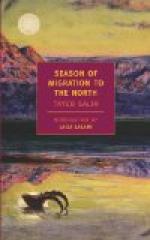A priest, on the winter trail between Fond du Lac and Fort Chipewyan a few winters ago, was travelling without fire-arms and, as his trail crossed that of the moving caribou, he had to delay his journey till they deigned to give him the right of way. It was impossible to pass through their ranks, and he hadn’t even the satisfaction of making a fat bull pay tribute to his Mother Hubbard cupboard.
Mr. Hislop, a fur-trader of Great Slave Lake, said to the writer, “At Fort Rae the caribou are and always have been very plentiful, I don’t think they will ever die out.” Rae was the old meat-station for the Far North, and the records show that after supplying local needs three thousand tongues were often exported in one season. If one intercepts a caribou-band in a little lake he may with patience kill them all without any trouble, as they run round and round on the ice, mystified by the wood-echoes and the reverberation of the shots.
When the Chipewyan filters into southern latitudes and weakens with pink teas the virility that should go with red blood, aping the elect he will cast round for a suitable coat-of-arms. The proper caper for him would be the caribou rampant with a whitefish flotsam. The whitefish (coregonus clupeiformis) is gregarious, reaching shallow water to spawn. Wherever you see Indian tepee-poles by the side of Northern waters you may guess that to be a good fishing spot. The poles are always hospitably left for the next comer, the Indian merely carrying with him the skin or canvas cover of his tepee. The location of the Hudson’s Bay forts was in the beginning determined by the good fishing-grounds, although now there is but indifferent fishing near some of the posts. It would almost seem that the whitefish have in their chilly veins as variable blood as any vagrant horde of caribou. The whitefish contains all elements necessary for human nourishment, and it is a happy fact that it does, for men and dogs in the North often live for solid months on nothing else. It is a rich fat fish and the usual mode of cooking it is by boiling. Northern people tell you that it is the only fish whose taste will never produce satiety, as it becomes daily more agreeable to the palate. I can’t say that it worked on our sensibilities in just that way. But it is the old story of de gustibus, etc. We see the Fond du Lac people this evening roasting upon the coals, as choice tit-bits, the stomachs of the whitefish. Scraping the dirt and ashes from the blackened morsel, they offer it to us as one would pass the olives in those lands so far below us where people wear dress-suits and railroads run. It is all a matter of latitude, after all, for when a bottle of olives was salved from the wrecked scow we had overheard this dialogue between two boatmen, as surreptitiously they broached cargo. “Do you like these?” “Yes.” “You’re a liar!” On the Athabasca trail, too, we had seen an untried soul struggling with his first olive. It was Shorty, the lightning-stricken heir of the house of Kennedy. He coveted one of the “plums” from our lunch-basket, and was much surprised when we suggested that it was an olive. “What are them?” “Olives,” we elucidated; “they come from Southern Europe by steamer.” “Do they?” (slightingly). “The one I et must have come steerage.”




